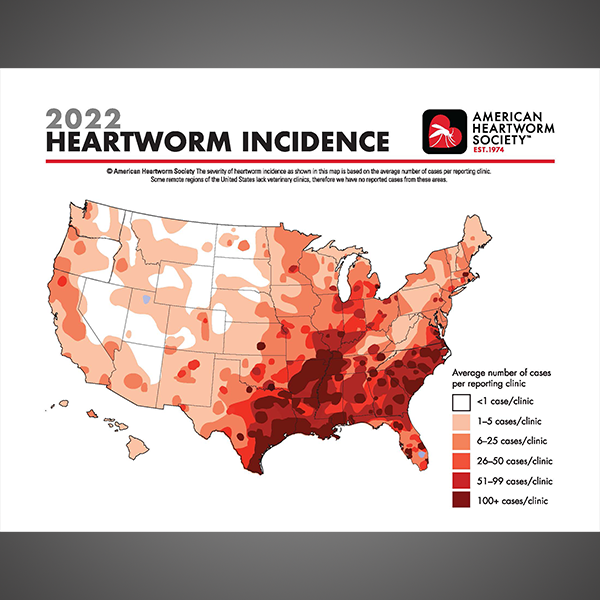American Heartworm Society: Your Ultimate Guide To Protecting Your Furry Friend
Heartworms are a serious threat to our beloved pets, and the American Heartworm Society is here to help us understand and combat this issue. If you're a pet owner, this topic is more important than you might think. Heartworms can lead to severe health problems, and prevention is key. But don't worry, the American Heartworm Society has got your back with tons of resources and guidelines to keep your furry friend safe and healthy.
Imagine this: You’re enjoying a cozy evening with your pup, and suddenly you start wondering about all the health risks they might face. Heartworms are one of those silent threats that can sneak up on your pet without warning. But here's the good news—the American Heartworm Society is like the superhero of pet health, offering tons of advice and resources to keep your pet safe. It’s not just about medication; it’s about education and awareness.
Now, you might be thinking, “Why should I care about heartworms?” Well, let me tell you, these tiny parasites can wreak havoc on your pet’s health. From damaging their heart and lungs to causing long-term complications, heartworms are no joke. That’s why organizations like the American Heartworm Society are so vital. They provide guidelines, research, and support to help pet owners stay informed and proactive. Let’s dive deeper into what the American Heartworm Society is all about.
Read also:Unbelievable Story Of The 188yearold Man Rescued A Journey Through Time And Survival
What is the American Heartworm Society?
The American Heartworm Society (AHS) is an organization dedicated to advancing the understanding and prevention of heartworm disease in pets. Founded in 1974, AHS has become a trusted authority in the field of veterinary medicine. Their mission is simple yet powerful: to lead the veterinary profession and public in understanding the significant health risks posed by heartworms and to promote effective strategies for their prevention, diagnosis, and management.
Here’s a quick breakdown of what the AHS does:
- Provides guidelines for veterinarians and pet owners on heartworm prevention and treatment.
- Conducts research to better understand heartworms and their impact on pets.
- Offers educational resources to raise awareness about heartworm disease.
- Collaborates with veterinarians and pet health experts to develop innovative solutions for combating heartworms.
Basically, the AHS is like your go-to source for everything heartworm-related. Whether you're a seasoned pet owner or a newbie, their resources can help you keep your furry friend healthy and happy.
Why Should You Care About Heartworms?
Heartworms are parasitic worms that live in the heart and lungs of infected animals. They can grow up to a foot long and cause significant damage to your pet’s cardiovascular system. Left untreated, heartworms can lead to heart failure, lung disease, and even death. That’s why prevention is so crucial.
But here’s the kicker—heartworms are transmitted through mosquito bites. Yep, those tiny buzzing nuisances are responsible for spreading this dangerous disease. And since mosquitoes are pretty much everywhere, your pet is at risk no matter where you live. That’s why the American Heartworm Society emphasizes the importance of year-round prevention, even in colder climates.
How Do Heartworms Affect Your Pet?
Heartworms can wreak havoc on your pet’s body. Here’s how:
Read also:Copper Door Coffee Roasters Your Ultimate Coffee Experience
- They damage the heart and lungs, leading to decreased stamina and difficulty breathing.
- They cause inflammation in the blood vessels, which can lead to blood clots and other complications.
- In severe cases, they can cause heart failure and death.
So, if you’re thinking, “My dog seems fine,” remember that heartworms can lurk in your pet’s body for years before symptoms appear. That’s why regular testing and prevention are so important.
Heartworm Prevention Guidelines by AHS
The American Heartworm Society has developed a set of guidelines to help pet owners prevent heartworm infections. Here’s what they recommend:
Year-Round Prevention: Regardless of where you live, the AHS advises using heartworm preventatives all year long. Even in colder climates, mosquitoes can survive indoors or during unseasonably warm weather. So, don’t take any chances!
Regular Testing: The AHS recommends annual heartworm testing for all dogs. This ensures that any infection is caught early, making treatment more effective and less costly.
Veterinary Consultation: Always consult with your veterinarian to choose the best preventative option for your pet. There are various types of preventatives, including oral medications, topical treatments, and injections. Your vet can help you decide which one suits your pet’s needs.
Types of Heartworm Preventatives
There are several options when it comes to heartworm prevention. Here’s a quick rundown:
- Oral Medications: These are pills or chewables that your pet takes once a month. They’re easy to administer and widely available.
- Topical Treatments: These are liquids applied to your pet’s skin, usually between the shoulder blades. They’re also given monthly and can protect against other parasites like fleas and ticks.
- Injections: Some veterinarians offer injections that provide protection for six or twelve months. These are great for pet owners who might forget monthly doses.
No matter which option you choose, consistency is key. Missing even one dose can leave your pet vulnerable to infection.
Understanding Heartworm Testing
Heartworm testing is a crucial part of preventive care. The test involves a simple blood sample that detects the presence of heartworm antigens. Here’s why testing is so important:
- It helps catch infections early, making treatment more effective.
- It ensures that your pet is healthy enough to start or continue preventative medication.
- It provides peace of mind, knowing that your pet is heartworm-free.
Remember, even if your pet is on preventative medication, annual testing is still necessary. Preventatives are highly effective, but nothing is 100% foolproof. Regular testing ensures that any missed doses or other factors haven’t put your pet at risk.
What Happens if Your Pet Tests Positive?
If your pet tests positive for heartworms, don’t panic. Treatment is available, but it’s important to act quickly. Here’s what you can expect:
- Your veterinarian will perform additional tests to determine the severity of the infection.
- They’ll develop a treatment plan tailored to your pet’s needs.
- Treatment typically involves a series of injections and medications to kill the adult worms and microfilariae (baby worms).
While treatment is effective, it can be costly and stressful for your pet. That’s why prevention is always the best approach.
Heartworm Disease in Cats
While heartworms are more commonly associated with dogs, cats can also be affected. However, the disease manifests differently in felines. Here’s what you need to know:
Heartworm-Associated Respiratory Disease (HARD): In cats, heartworms can cause a condition known as HARD. This involves inflammation in the lungs and airways, leading to symptoms like coughing, wheezing, and difficulty breathing.
Diagnosis and Treatment: Diagnosing heartworms in cats can be tricky, as they often don’t show symptoms until the disease is advanced. Treatment is also more challenging, as there’s no approved medication to kill adult heartworms in cats. Instead, veterinarians focus on managing symptoms and providing supportive care.
That’s why prevention is even more critical for cats. Talk to your vet about the best preventative options for your feline friend.
Preventative Options for Cats
There are several heartworm preventatives available for cats. These include:
- Topical Treatments: These are applied to the skin and provide protection against heartworms, fleas, and other parasites.
- Oral Medications: These are pills or chewables given monthly to prevent heartworm infections.
Again, consistency is key. Make sure your cat receives their preventative on schedule to keep them safe from heartworms.
Common Myths About Heartworms
There are plenty of myths floating around about heartworms. Let’s bust a few of them:
- Myth: Heartworms only affect dogs. Fact: Cats can also get heartworms, though the disease manifests differently in felines.
- Myth: Heartworms are only a concern in warm climates. Fact: Heartworms can be found in all 50 states, so prevention is important no matter where you live.
- Myth: Indoor pets are safe from heartworms. Fact: Mosquitoes can get indoors, so even indoor pets are at risk.
Don’t fall for these myths. Trust the experts at the American Heartworm Society for accurate information and guidance.
Why Trust the American Heartworm Society?
The American Heartworm Society is a respected authority in the field of veterinary medicine. Their guidelines and recommendations are based on extensive research and collaboration with experts in the field. Here’s why you should trust them:
- They’ve been leading the fight against heartworms for over 40 years.
- They partner with veterinarians and researchers to develop the most effective prevention and treatment strategies.
- They provide up-to-date information and resources to help pet owners stay informed.
When it comes to protecting your pet from heartworms, the AHS is your go-to source.
Conclusion: Take Action Today
In conclusion, heartworms are a serious threat to our pets, but with the right prevention and care, we can keep them safe. The American Heartworm Society is an invaluable resource for pet owners, offering guidelines, research, and support to combat this dangerous disease. Remember, prevention is key—so make sure your pet is on a year-round preventative and get them tested annually.
Take action today to protect your furry friend. Talk to your veterinarian about the best preventative options for your pet, and stay informed with the latest information from the American Heartworm Society. Together, we can keep our pets healthy and heartworm-free.
Table of Contents
- What is the American Heartworm Society?
- Why Should You Care About Heartworms?
- Heartworm Prevention Guidelines by AHS
- Understanding Heartworm Testing
- Heartworm Disease in Cats
- Common Myths About Heartworms
- Why Trust the American Heartworm Society?
- Conclusion: Take Action Today
So there you have it—a comprehensive guide to heartworm prevention and the American Heartworm Society. Stay informed, stay proactive, and keep your furry friend safe and healthy!


